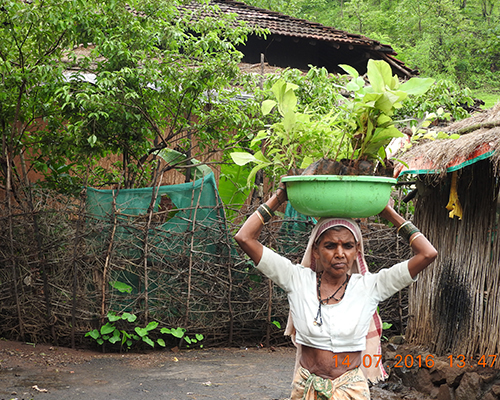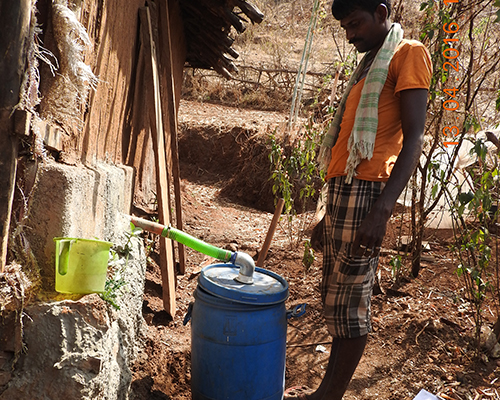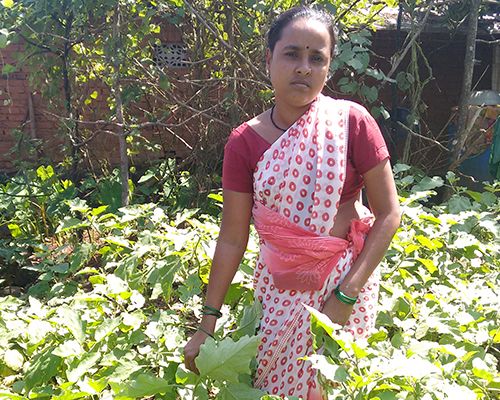Sustainable Communities
Bioprospecting
Sustainable Communities
- Livelihood Support and Nutritional Security through Food Processing and Fortification
- Nutritional Security and Livelihood Support through Off-farm Livelihood initiatives
- Nutritional Security through Nutri-Gardens and Food Fortification
- Developing Pathardi in Palghar District into a Sustainable Village
- Canteen for Teens - Focusing on "Know, Grow and, Cook your own food" for Urban Youth
- Urban Farming - A Sustainable Approach for Urban Nutrition
Developing Pathardi in Palghar District into a Sustainable Village Duration: 2015-Present Sponsor: GKN Sinter Metals Pvt. Ltd
Having successfully demonstrated the implementation of nutri-gardens at Wada block, it was realized that the concept has immense replication potential. Given the remote location of Pathardi village, Mokhada, Palghar coupled with severe water crisis and malnutrition, it was selected for implementation of the PROTEIN project to make it a more sustainable village. With continual and strong support from GKN, TERI succeeded in improving the nutritional status of the village, providing a source of water for yearlong usage through re-use and recycling, efficient energy usage and so on.
To ensure a long term nutrition security, TERI identified the related niche areas that were needed to be addressed as follows:
- Health and Nutrition,
- Access to energy and water
- Livelihood and skill development
Health and Nutrition
Interventions were planned specifically to reduce and gradually remove the micro-nutrient deficiencies within the target group of children and women in the village. Health check-up camps conducted revealed that the women and children suffered from severe iron and vitamin deficiencies, as was the general trend in the area. Thus, TERI encouraged the inclusion of highly nutritious ingredients such as dry mushroom powder, into the daily diet, along with providing training on its benefits, and various preparation methods. TERI encouraged the villagers to consume iron rich green leafy vegetables by providing them with seeds and saplings of edible plants, rich in iron content. To ensure long term food and nutrition security, TERI provided more than 3000 saplings of fruit trees and economically important trees such as papaya, custard apple, mango, chikoo, amla, cashewnut, and so on to the villagers.
 A women carrying home the fruit tree saplings recieved
A women carrying home the fruit tree saplings recieved TERI promoted the establishment of around 55 nutri-gardens at the household level as a ready source of fresh vegetables to overcome the shortage of essential nutrients in their daily diet. With this, the significance of food consumption patterns and diversity needed in the diet was also highlighted. A ‘Nutri-garden Competition’ was conducted to encourage cultivation of diverse vegetables.
Inorder to combat the extreme water scarcity (except during the monsoons) faced by the villagers hindering the cultivation of vegetables the treatment and re-use of grey water (the water used for bathing and washing utensils) was promoted. Grey-water treatment systems using a simple sand filter which treats water at the primary level, were installed at 27 households which had suitable conditions and constructed bathrooms along with the availability of appropriate outlets for the release of the water. Allowing for filtration losses, approximately 40 litres of water could be collected per household. The villagers were encouraged to use this treated water to cultivate vegetables in their respective nutri-gardens. The remaining water could be used for secondary purposes such as construction, cleaning and gardening. This system indirectly reduced the number of trips the women in the village had to make in order to fetch water for secondary purposes, enabling them to maintain their nutri-gardens with the saved time.
Energy and Water Access
 A villager with the greywater treatment system at his home
A villager with the greywater treatment system at his home Energy Access: There was a high dependence on firewood in the village. The constant need for large quantities of wood compels the village women to source the wood from the nearby forests in spite of the risk of getting apprehended by the forest guards. Also, the traditional chulhas did not cause the wood to burn completely which led to excessive smoke being generated, causing indoor pollution along with the wastage of energy (wood). Moreover, the traditional chulhas trigger off a significant number of health problems such as breathing complications, itching and watering of the eyes. These problems could have long term impacts on the health of the women using the chulhas and their families, while also causing air quality degradation and wastage of energy. In order to combat this problem, TERI provided smokeless or energy efficient chulhas to 57 households along with the training and a demonstration workshop on their use and maintenance. The women of the village confirmed that the new stove is much easier; consumes a lot less fuel wood, greatly decreasing the number of trips to collect fuel wood.
Research showed that the stove was found to be efficient, hassle free and easy to use and clean.
| Thermal efficiency: | 25.00% |
| CO | 5.00g/MJd |
| TPM | 239.94mg/MJ |
| Power Output | 1.40KW |
As per a study conducted by TERI to assess the indoor air quality, the use of the improved cook stove had a great impact in reducing the PM concentration and smoke. The mean PM2.5 concentration in homes using the improved Biomass Stove was observed to be ~28% lower than the measures taken in HHs using TCS (Traditional Biomass Stoves).
Water Access: Women were motivated to offer ‘shramadan’ (voluntary contribution of labour) to clean the nearby pond in the village, through community participation. Around 25 women came forward to de-silt the pond. Furthermore, mechanical devices were deployed to de-silt up to 4ft to enhance the recharging capacity and store fresh water post monsoon.
Livelihood and skill development
 A women showcasing the vegetables growing in her nutri-garden
A women showcasing the vegetables growing in her nutri-garden In the proposed 4th phase (year 2017-18) of implementation, TERI has proposed to explore opportunities for alternate livelihoods through interventions like small ruminant (goat) rearing, backyard poultry and bamboo basket making as well as continual measures to strengthen the food and nutrition security of the community. An additional livelihood option will help the villagers obtain a sustainable source of livelihood that will not be reliant on agriculture alone, thereby protecting them from environmental shocks and stresses like droughts. This in turn will help them to have better resources to ensure the nutritional security of their families leading to a better quality of life and other snowball effects.
